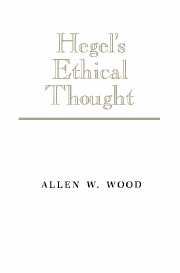5 - Persons, property, law
Published online by Cambridge University Press: 05 June 2012
Summary
Persons and their abstract right to things
English-speaking philosophy recognizes a distinction between “legal” and “moral” rights, the former established by positive law, the latter with a foundation in morality. Along with other German philosophers of the same period, Hegel maps the ethical landscape differently. For him, the fundamental distinction is between right (Recht) and ethics or morality (Sitte, Moral, Ethik). As we saw in Chapter 3, § 9, Recht (the whole body of law, constitutional, criminal or civil, or the rational foundation of law and the state) contrasts with Gesetz (particular positive legal statutes). Right (Recht) is capable of codification in positive law, but it has a rational foundation independent of positive law. Right is also independent of morality – of virtue, goodness of will, and the proper ends of conduct.
Hegel also has a technical sense of Recht that is even broader than this: “Right” refers to any existent that is the existence of the free will, any object in which the free will is with itself (PR § 29). In this sense, “right” refers to the whole realm of objective freedom, including morality and ethical life, and the whole of modern social organization. Hegel also uses “right” in the traditional sense, contrasting it with ethics or morality and referring to the sphere of people's rights that are subject to protection by coercive positive laws. For this purpose he uses the term “abstract right.”
- Type
- Chapter
- Information
- Hegel's Ethical Thought , pp. 94 - 107Publisher: Cambridge University PressPrint publication year: 1990

